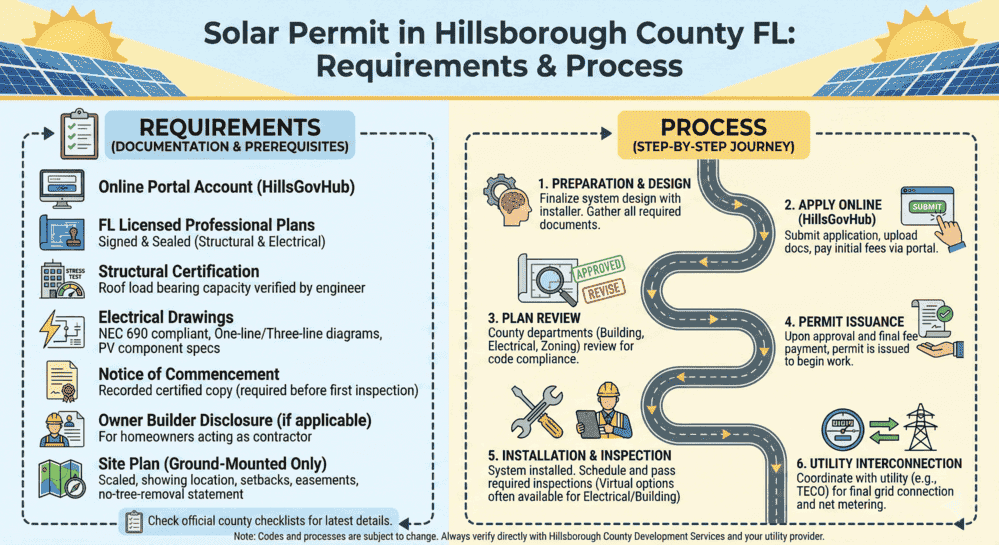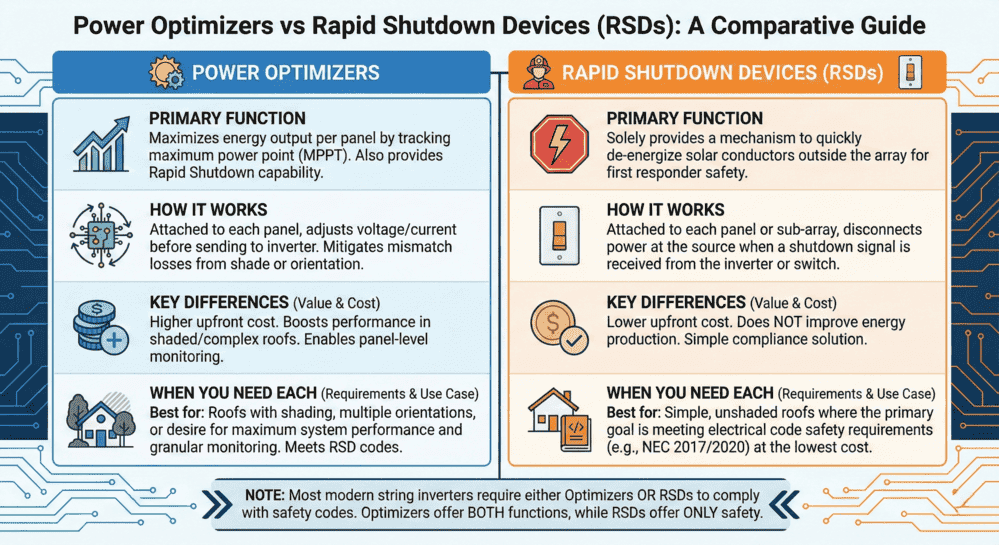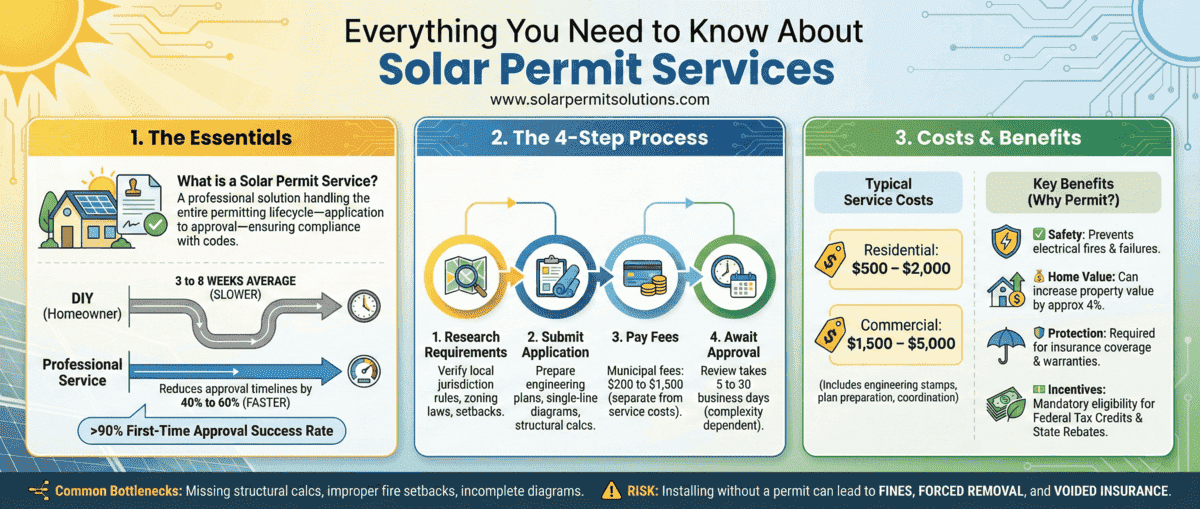What is a solar permit service? A solar permit service is a professional solution that handles the complete permitting process for solar panel installations, from application preparation and engineering documentation to code compliance verification and approval coordination with local building departments.
Why use one? The standard DIY permitting process takes 3 to 8 weeks and has high rejection rates due to documentation errors. Professional solar permit services reduce approval timelines by 40 to 60 percent while minimizing costly resubmissions.
Typical costs: Professional solar permit services range from $500 to $2,000 for residential projects and $1,500 to $5,000 for commercial installations, separate from municipal permit fees ($200-$1,500).
Key benefits:
- First-time approval rates exceeding 90%
- Stamped engineering calculations and code-compliant documentation
- Navigation of jurisdiction-specific requirements across all 50 states
- Coordination with building departments and utility interconnection
When it comes to securing solar permits, we know the process can seem overwhelming due to the various elements involved. This guide will offer detailed insights to help you streamline the solar permit acquisition process, ensuring you get approval both quickly and efficiently.

What is a Solar Permit and Why Do You Need One?
Before diving into the details of how to obtain a solar permit, it’s essential to first understand what this permit represents. A solar permit is an official approval provided by your local government, granting permission to install a solar panel system at a designated property. This document plays a crucial role in ensuring that your solar system complies with all the necessary safety guidelines, construction standards, and zoning regulations in your area. By adhering to these codes, you help protect both your property and the broader community, ensuring a safe and efficient solar installation.
Why Solar Permits Matter: Legal Requirements and Benefits
Obtaining a solar permit is crucial because it’s a legal obligation in most regions. Failing to acquire one can lead to significant penalties, including hefty fines or potential legal consequences. Beyond the legal requirements, securing a solar permit ensures that your solar panel system is installed correctly and adheres to the highest safety standards. This process not only protects your property but also guarantees that your system operates efficiently, giving you peace of mind and long-term benefits.
Steps to Securing a Solar Permit
While the idea of obtaining a solar permit may feel overwhelming at first, the process is fairly simple if you understand the necessary steps. By knowing what to expect, you can navigate the system with ease. Below are the key steps you should follow to successfully obtain a solar permit:
Step 1: Understand Your Area’s Solar Permitting Guidelines
The initial step to securing a solar permit involves understanding the permitting guidelines specific to your location. Since rules and regulations can differ widely between regions, it’s essential to familiarize yourself with the requirements in your jurisdiction. Begin by visiting your local government’s website or reaching out directly to the local permitting office to gather the most accurate and up-to-date information. This proactive approach will help ensure that you’re fully prepared when it comes time to submit your application.
Step 2: Complete and Submit Your Solar Permit Application
After familiarizing yourself with the permitting guidelines, the next crucial step is to complete and submit your solar permit application. This application will typically require details about your solar panel system, including its size and where it will be installed on your property. In many cases, you’ll also need to provide comprehensive building plans and engineering diagrams to demonstrate the system’s compliance with safety and structural standards. Make sure all required documents are accurate and thoroughly prepared before submission to avoid delays in the approval process
Step 3: Handle Permit Fees Promptly
Once you’ve submitted your permit application, the next step is to take care of any necessary permit fees. These fees can fluctuate based on the size and complexity of your solar panel installation, so it’s important to account for them in your overall budget for the solar project. Being proactive in managing these costs will help you avoid surprises later on and ensure that your project stays on track financially. By understanding and preparing for these expenses, you’ll be one step closer to enjoying the benefits of your new solar system.
Step 4: Await Permit Approval
After you’ve submitted your permit application and paid the necessary fees, the local permitting office will begin the review process. They will carefully evaluate your application to ensure that all details are complete and compliant with local regulations. If everything checks out, you’ll receive approval for your permit, allowing you to proceed with the installation of your solar panel system. This stage is a significant milestone, so it’s essential to stay informed during the review process and be ready to address any questions or requests for additional information from the permitting office.
Solar Permit Solutions
Skip the Permit Headaches
We design plan sets that pass inspection the first time. Code-compliant, PE-stamped, accepted by AHJs nationwide.
Advantages of Securing a Solar Permit
Securing a solar permit provides a variety of advantages, including:
Safety Assurance
Solar permits mandate inspections to verify that your solar panel installation is both safe and compliant with local codes. This critical step helps mitigate risks such as electrical fires, electrocution, and other dangers that may stem from improper installations or defective equipment. By ensuring that everything meets safety standards, you can enjoy the benefits of solar energy with confidence, knowing that your system operates safely and effectively. These inspections not only protect your investment but also enhance the overall safety of your home.
Adherence to Building Codes
Securing a solar permit guarantees that your solar panel installation adheres to the building codes and regulations established by local and state authorities. This compliance is crucial for avoiding fines or penalties that can arise from non-conformity. By following the proper permitting process, you not only protect yourself from potential legal issues but also contribute to the integrity of the community’s standards. Ensuring that your installation is up to code enhances its reliability and longevity, making it a smart investment in both your property and your peace of mind.
Quality Assurance through Permitting and Inspections
Acquiring a permit and undergoing inspections plays a vital role in ensuring the quality of your solar panel installation. These processes help verify that your system meets industry standards, promoting optimal performance and efficiency. By ensuring that everything is installed correctly, you maximize the advantages of solar power, allowing you to fully reap the benefits of clean, renewable energy. This quality assurance not only safeguards your investment but also enhances the long-term sustainability of your solar energy system.
Boosting Home Value with Solar Panel Installations
Installing solar panels can significantly enhance your home’s value. Securing a solar permit offers you the necessary documentation proving that your installation adheres to local and state building codes, ensuring it was completed properly. This compliance not only reassures potential buyers but also makes your property more appealing in a competitive market. As more homebuyers prioritize energy efficiency and sustainability, a certified solar panel system can serve as a major selling point, ultimately increasing your home’s attractiveness and market value.
Ensuring Insurance Coverage for Your Solar Installation
Many insurance providers mandate proof of permits and inspections for solar panel installations to qualify for coverage. By securing a permit, you not only comply with local regulations but also protect your investment. This documentation ensures that your solar panel system is covered in the event of damage or unforeseen incidents. Having a properly permitted installation gives you peace of mind, knowing that your insurance will fully support you, allowing you to enjoy the benefits of solar energy without worrying about potential liabilities.
Rebates and Incentives for Solar Installations
Many states and local governments provide rebates and incentives for homeowners who choose to install solar panels. Often, securing a solar permit is a prerequisite for qualifying for these financial programs. By obtaining the necessary permit, you position yourself to take full advantage of these opportunities, potentially reducing the overall cost of your solar panel installation. This proactive step not only enhances the affordability of your solar investment but also encourages the transition to renewable energy, benefiting both your wallet and the environment.

DIY Solar Permits vs. Professional Services: Which is Right for You?
When DIY Permitting Makes Sense
- Simple residential rooftop system under 10kW
- Your jurisdiction uses SolarAPP+ for instant permitting
- You have experience reading electrical diagrams and building codes
- Your local AHJ has straightforward, well-documented requirements
- You have time to research jurisdiction-specific rules
When Professional Permit Services Are Worth It
- Commercial installations or systems over 10kW
- Complex roof structures requiring structural engineering
- Jurisdictions with strict requirements or high rejection rates
- Battery storage systems with additional code requirements
- Multi-state installation companies needing consistent quality
- Projects with tight timelines (professional services reduce approval time by 40-60%)
Cost Comparison
Solar Permit Document Checklist: What You Need to Submit
Every Authority Having Jurisdiction (AHJ) has specific requirements, but most solar
Permit applications require these core documents:
Required for All Solar Permits
☐ Completed permit application form
☐ Site plan showing property boundaries and panel placement
☐ Roof layout with dimensions, setbacks, and fire pathways
☐ Electrical single-line diagram
☐ Equipment specification sheets (panels, inverters, racking)
☐ Manufacturer UL listing certificates
☐ Contractor license and insurance documentation
Often Required (Jurisdiction-Dependent)
☐ PE-stamped structural calculations
☐ Three-line electrical diagrams
☐ Rapid shutdown system details and labeling plan
☐ Battery/energy storage specifications (if applicable)
☐ HOA approval letter
☐ Utility interconnection pre-approval
Commercial Projects May Also Need
☐ Geotechnical reports (ground-mount systems)
☐ Environmental impact assessments
☐ Fire marshal review documentation
☐ ADA compliance verification (parking canopies)
Pro tip: Missing even one document can delay approval by weeks. Professional
Permit services ensure complete packages before submission.
Common Reasons Solar Permits Get Rejected
Even well-prepared applications face rejection risks. The most frequent issues include:
- Missing PE-stamped structural calculations
- Incorrect conductor sizing on electrical diagrams
- Incomplete equipment spec sheets or expired UL listings
- Fire setback and rapid shutdown documentation errors
- Battery clearance violations for energy storage systems
- Professional permit services catch these issues before submission, achieving first-time
- approval rates above 90%.
See our complete guide to solar permit rejections and how to avoid them.
Conclusion
Securing solar permits is a vital step in the process of installing solar panels. Understanding the importance of these permits helps ensure that your installation complies with local regulations and safety standards. By taking the necessary steps, such as familiarizing yourself with local guidelines, completing your application accurately, managing fees promptly, and patiently awaiting approval, you can navigate the permitting process with ease. Not only does obtaining a solar permit protect your investment and enhance the safety of your installation, but it also boosts your home’s value and ensures compliance with insurance requirements.
Navigating the solar permit process requires understanding regulatory frameworks, documentation standards, and jurisdiction-specific requirements that directly impact project timelines and installation success. Professional solar permit services eliminate common bottlenecks by managing technical submissions, coordinating with building departments, and ensuring compliance with evolving code requirements. Whether you’re pursuing residential installations or managing commercial solar projects, leveraging specialized expertise accelerates approvals while reducing costly revision cycles and resubmission delays.
The value of proper permitting extends beyond regulatory compliance to encompass financial protection, insurance eligibility, and long-term system performance validation. Jurisdictional variations create significant complexity, particularly in states with stringent requirements. Property owners in regions like Florida or California benefit from working with professionals who understand local nuances and maintain established relationships with plan reviewers. Similarly, specialized solar permit services in Colorado Springs, CO and solar permit design in San Antonio, TX provide localized expertise that streamlines approval workflows.
As municipalities implement standardized solar permitting practices and digital submission platforms, understanding the average solar permit timeline by state helps establish realistic project expectations. The permitting phase establishes foundational documentation that supports inspection readiness, utility interconnection approval, and incentive qualification. Investing in professional permit services protects your solar investment, accelerates time to installation, and ensures your system delivers optimal performance from day one. By prioritizing compliance and quality documentation, you position your project for long-term success while maximizing available financial incentives and property value enhancement.
Solar Permit Solutions specializes in comprehensive solar permit design services for residential, commercial, and off-grid projects. With our expertise, you can simplify the permitting process and move forward confidently with your solar energy plans. Don’t let the complexities of securing permits hold you back, contact us today to ensure a smooth and efficient transition to solar energy!
FAQs
Can solar permit services handle permits in multiple states?
Yes, reputable solar permit services maintain licensing across multiple states and employ engineers licensed in specific jurisdictions. This is valuable for installation companies managing regional operations or property owners with systems in different locations. Consulting resources like Green Building Advisor provides additional technical guidance on regional building code variations and best practices for multi-jurisdiction projects. Professional permit services leverage established relationships with building departments nationwide, understanding regional preferences and documentation standards that aren’t always explicitly stated in official requirements.
Skip the Permit Headaches
We design plan sets that pass inspection the first time. Code-compliant, PE-stamped, accepted by AHJs nationwide.
Frequently Asked Questions
Solar permits typically require stamped engineering drawings, electrical single-line diagrams, site plans, equipment spec sheets with UL listings, structural calculations, and contractor licensing. Requirements vary by Jurisdiction and professional permit services ensure complete documentation.
Professional solar permit service fees generally range from $500 to $2,000 for residential installations and $1,500 to $5,000 for commercial projects, depending on system size, complexity, and jurisdictional requirements. These costs typically include engineering plan preparation, stamped structural calculations, electrical diagram creation, application submission coordination, and plan review response management. Service fees are separate from municipal permit fees charged by building departments, which range from $200 to $1,500 based on system capacity and local fee schedules. While professional services represent an upfront investment, they often reduce total project costs by preventing expensive revision cycles, minimizing approval delays that extend contractor scheduling, and ensuring first-time approval rates exceeding 90 percent.
Yes, reputable solar permit services maintain licensing across multiple states and employ engineers licensed in specific jurisdictions. This is valuable for installation companies managing regional operations or property owners with systems in different locations. Professional permit services leverage established relationships with building departments nationwide, understanding regional preferences and documentation standards that aren't always explicitly stated in official requirements.
Rejected permits require corrections and resubmission within 30-90 days. Common rejection reasons include missing structural calculations, incorrect electrical diagrams, or non-compliant equipment. Professional permit services typically include revision support at no extra cost.
Most comprehensive services include utility interconnection preparation. This separate approval process adds 2-6 weeks beyond building permits. Professional services coordinate both approvals simultaneously to minimize total project timeline. Complete permit service packages manage both building department and utility coordination, ensuring all required approvals are secured before installation begins and preventing costly project delays.
SPS Editorial Team
Solar Permit Solutions
Solar Permit Solutions provides professional solar permit design services for residential, commercial, and off-grid installations across all 50 states. Our team ensures permit-ready plan sets delivered fast.
Related Articles

Solar Permit in Hillsborough County FL: Requirements & Process
Hillsborough County solar permits require either an Electrical Trade permit for ...

Power Optimizers vs Rapid Shutdown Devices: Differences, Requirements & When You Need Each
When planning a solar installation, understanding the difference between rapid s...

Your Complete DIY Solar Panel Installation Guide
Homeowners turn to solar energy for various motivations. Clean, renewable power ...
